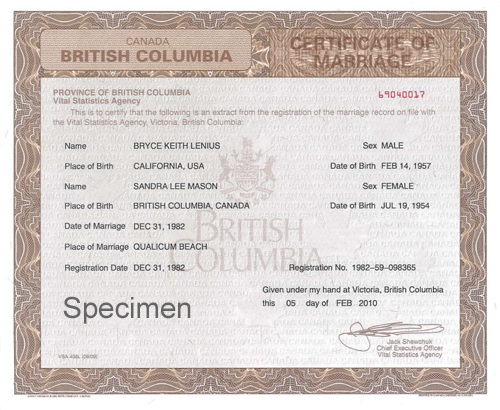How Do I Get Married in British Columbia?
Get a marriage licence[edit]
First, you have to get a marriage licence. Either you or your future spouse must apply in person to the marriage licence issuer in your neighbourhood. (The Vital Statistics Agency offers a convenient search tool to help you find a marriage licence issuer near you.) You'll have to provide government-issued photo identification, pay a fee of about $100, and supply the following information:
- Your full name, address, date of birth, and place of birth.
- Your future spouse's full name, date of birth, and place of birth.
- Your present marital status (never married, widowed, divorced).
- Your future spouse's present marital status.
If you or your future spouse were divorced within the last 31 days, you'll also have to provide:
- Proof of your divorce (either the divorce order or a certificate of divorce).
If you or your future spouse are younger than age 19, you'll also have to have the consent of the parent of the minor. The marriage licence issuer will have the forms you'll need. No one under the age of 16 can be married without a court order.
You don't have to be a resident of British Columbia to get married here. Blood tests are not required.
Remember that a marriage licence is only valid for three months from the date of issue. If your marriage ceremony doesn't happen within those three months, you'll have to reapply for another one.
Get married[edit]
Next, you need to get married! There are two types of marriage ceremony to choose from, civil and religious. Civil ceremonies are performed by marriage commissioners, officials registered with the Vital Statistics Agency. Religious ceremonies are performed by religious officials such as ministers, rabbis, imams, priests, and so forth; however, the religious official must be registered with the Vital Statistics Agency for the marriage to be valid.
Whichever sort of marriage ceremony you're planning, your marriage must be witnessed by two people who are at least 19 years of age or older.
If you're planning on a civil ceremony, you'll need to book your marriage commissioner right away. It may be extraordinarily difficult to track someone down who's available at the last minute. The fee your commissioner will charge is $75, plus other costs for expenses like parking and transportation. The nice folks at the Vital Statistics Agency have a search tool to help you find a marriage commissioner.
Register your marriage[edit]
The marriage commissioner or religious official who conducts the ceremony will help you complete a Marriage Registration Form. This form must be sent, within 48 hours of the ceremony, to the Vital Statistics Agency for registration. The person who conducts your ceremony will normally take care of this for you.
The Vital Statistics Agency will send you a spectacularly ugly certificate of marriage, which will look something like this:

This isn't something you're going to want to hang on the wall. It is, however, something you should hang onto, in case you need proof of your marriage or want to apply for a divorce.
The person who conducts your ceremony may provide you with a document confirming your marriage. This can be used to prove that you are married before your marriage is registered with the Vital Statistics Agency and you receive your government-issued marriage certificate.
Changing your name[edit]
It is not necessary that either you or your spouse change your surnames after marriage, but it is your right to change your surname to your spouse's surname if you wish. There will be no official change of name — or an amendment to your birth certificate, for that matter — but it is perfectly legal to use your spouse's surname without an official name change.
If you want a legal change of name, you must apply to change your name through the Vital Statistics Agency under the Name Act. However, as long as you don't legally change your name, you can revert to your old surname whenever you wish.
If you have decided to have a hyphenated surname following your marriage, you must apply for a legal change of name or you will not be able to obtain ID in the new name.
You can find out more about changing your name in the chapter Overlapping Legal Issues and Family Law within the section Naming and Changes of Name.
For more information[edit]
You can find out more about the laws on marriage in the chapter Family Relationships, within the section Marriage & Married Spouses.
| This information applies to British Columbia, Canada. Last reviewed for legal accuracy by Yun Chen, 24 October 2023. |
| |||||||||||||||||||||||||||||||||||||||||||||||||||||||||||||||||||||||||||||||||||||||||||||||||||||||||||||||||||||
